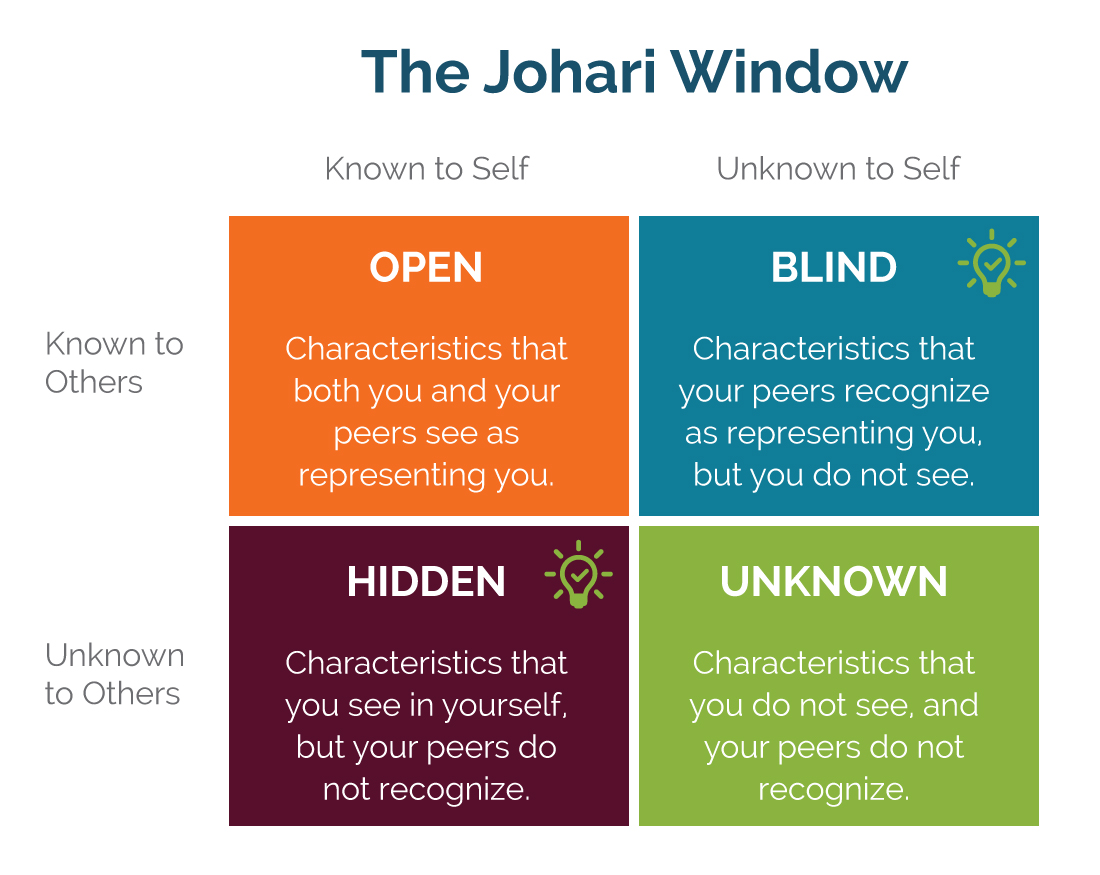To be fair, it is not easy to stand in front of a mirror and confront both strengths and weaknesses within us. However, the value of doing so is immeasurable. To approach this topic in coaching conversations, I like to pull in the Johari Window perspective. The Johari Window is a psychological model used to describe the relationship between self-awareness and self-disclosure. It divides the personality into four quadrants:
- Open Area: Known to self and others. This includes traits, behaviors, and feelings that are readily apparent and shared openly.
- Hidden Area: Known to self but not to others. This includes thoughts, feelings, and experiences that are kept private.
- Blind Area: Known to others but not to self. This includes aspects of your personality or behavior that others are aware of, but you are unaware of.
- Unknown Area: Unknown to self and others. This includes aspects of your personality or experiences that have yet to be discovered.
The magic happens when you can help someone better understand their own Blind Area behaviors and shine a light on those unknown behaviors that are counterproductive.
When someone mentions that they are frustrated by working with someone who lacks self-awareness, my first challenge back is to ask them if they recognize their own Blind Areas. Naturally, they aren’t aware of any blind areas (or claim they have high self-awareness). Even if that is true, my second challenge is to get them to find a trusted colleague and answer the following questions:
5 questions that help uncover Blind Area behaviors
- When am I at my peak performance? What do you notice that I’m specifically doing when I’m having the greatest impact on others?
- When have you observed me not at my peak performance? What was different about my actions/behaviors at those times?
- What are the skills/capabilities that you most appreciate about me at work? Why do you think these attributes are important?
- What skills/capabilities do you think would most help me to be a better leader or teammate? Why are these attributes important?
- What are the 1-2 things about me at work that you think I might not be aware of? What do you specifically notice about these attributes and the impact on our workplace?
You’ll notice that the questions are a combination of identifying both positive and negative feedback areas. That’s by design. If you are trying to solicit feedback from others and only emphasize finding out negative insights, you are much less likely to uncover the deep answers you need. When combining positive and negative feedback, it makes it easier for a trusted colleague to be honest with you.
To get the most out of these questions, simply follow these three steps:
STEP ONE – PREPARATION
Ask a trusted colleague to spend 20-30 minutes with you to help you with your own self–awareness. You should tell them that there are five questions you’d like them to think through in advance, and then meet with you to talk through their answers. As a courtesy, give them at least 3-5 business days to think through the questions and answers so they will have time to prepare.
STEP TWO – DURING THE MEETING
Spend the time truly listening to the answers and do not try to chime in or correct any commentary that you hear. It is fine to ask clarifying questions, but you should focus your energy on listening only – not trying to guide the conversation or disagreeing with any of the feedback (even if it isn’t easy to hear).
STEP THREE – AFTER THE MEETING
Think carefully about the feedback and try to understand where any corrective behavior advice could come into play. Are there meetings, presentations, or leadership situations where you can change your normal approach and test out any new and evolved approaches. When you do try out those approaches, try to go back to your trusted colleague to get advice on whether or not they have noticed any differences/improvements.
FINAL ADVICE:
Not only can you use these questions and feedback to uncover your own Blind Area behaviors, but you can skillfully use this for colleagues that you feel lack self-awareness. Simply deliberately ask them if they will take the time to provide you with the answers for these five questions, stating that you have read that it is a great personal growth exercise to raise self-awareness. Then see if they ask you if you can take time to answer these same questions for their benefit. (If they don’t proactively ask, you can always say “I’ll be happy to do the same courtesy for you as a thank you for helping me.”)
There are two ways CPL can help.
First, identifying your work behaviors (both good and bad) is one of the many topics in my new book “Solving Your Career Mystery” – that can help you with not only advancing your career, but also everyday business challenges. Pick up your copy now.
Second, consider enrolling in our Individual Development Program. Topics we address are customized based on your needs and the number of detailed issues that you want to explore. Identifying your work behaviors can definitely be a topic!



